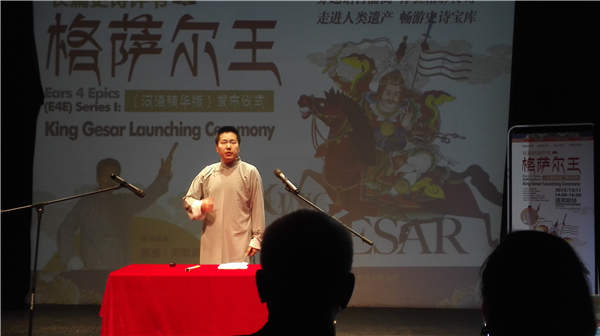Internet podcast brings new life to ancient legend
Updated: 2016-02-01 07:56
(Xinhua)
|
||||||||
 |
|
Pingshu performer Zhang Zhun delivers The Epic of King Gesar in Mandarin. Wang Jiaquan / Xinhua |
Long the purview of singers and storytellers, The Epic of King Gesar is now being introduced to new audiences via a new realm: the Internet.
Han storyteller Zhang Zhun worked with Tibetologist Gyanpian Gyamco to produce a 40-episode podcast in Mandarin based on the vast oral narrative about the warrior with boundless supernatural powers.
The episodes are performed in the pingshu style, which features literary and performance devices, such as the use of a poem or rhyme to begin each story, the striking of a gavel to gain the audience's attention and the use of suspense, by way of a cliffhanger, to end each chapter.
Since King Gesar first aired in mid-December on Litchi FM, a podcast platform, the first 10 episodes have been downloaded more than 40,000 times.
The legend has been traced back as far as the 12th century, and the inherent flexibility of oral storytelling has led to a vast number of narratives. Recurring, popular motifs find Gesar sent by the gods to vanquish monsters, end wars and unify the tribes in Ling, a kingdom on the Tibetan plateau.
Zhang's pingshu version is part of the nonprofit program Ears for Epics, which aims to preserve and promote traditional storytelling. Ears for Epics is the brainchild of the Reading China Salon at the Chinese Culture Translations and Studies Support, the Beijing Dongcheng District Library and Litchi.
Performing the epic in pingshu will not only help Mandarin speakers understand the Tibetan story, but it could also help to popularize pingshu. The 1,000-year-old pingshu style-witnessed a revival in the 1970s and '80s, when radios became widely available. Its popularity waned, however, with the advent of new entertainment alternatives since the 1990s.
Zhang is no stranger to re-imagining works in the pingshu style, having won acclaim for an adaptation of the Japanese cartoon series One Piece, which he produced two years ago.
Adapting King Gesar was no easy task, Zhang said, and the biggest challenge was the different cultural understanding of literary tropes.
For example, while no Tibetan has ever questioned how Gesar's half brother, the unbeatable Chatsa, could be killed by a single arrow, many of Zhang's Han listeners would not have accepted such a plot device.
"How can an invincible hero die such a humiliating death?" Zhang asked.
As many of his target audience would object to such an easy murder, this had to be changed for the new adaptation, which is based on a shortened Chinese version of the epic compiled by Gyanpian Gyamco. Although the Tibetan scholar was open to changes to the narrative to make it "listener friendly", he insisted on the retention of the story's essence. So a new scenario for Chatsa's death was created that would be accepted by the listener, as well as Zhang and Gyanpian Gyamco.
Zhang had not heard of the Gesar epic tradition before he began the project and is aware that his adaptation strays from the original narrative. That said, Gyanpian Gyamco endorsed Zhang's version.
"It is difficult to tell a Tibetan story to those who have no understanding of our culture. The listeners of this story are not Tibetans, and this was Zhang's greatest challenge. I think he has done really well to find the right balance," Gyanpian Gyamco said.
That goes to the heart of what Zhang set out to do. His adaptation "was made to inspire non-Tibetan speakers to listen to this classic epic", he said. "That's what I want."
- Students must learn safety education, experts say
- 73 bodies recovered from rubble of Shenzhen landslide
- Chinese travelers lead 2015 global outbound tourism
- S Korea to issue 10-year visa to highly-educated Chinese tourists
- A glimpse of Spring Rush: little migrant birds on the way home
- Policy puts focus on genuine artistic students
- Negotiating political transition in Syria 'possible': Hollande
- At least three killed in light plane crashes in Australia
- BOJ further eases monetary policy, delays inflation target
- DPRK may have tested components of hydrogen bomb
- Goodwill sets tone at Wang, Kerry's briefing
- Obama picks new Afghan commander

 Year of the Monkey arriving in Washington
Year of the Monkey arriving in Washington
 Djokovic puts down Federer fightback to reach final
Djokovic puts down Federer fightback to reach final
 Treasures from Romania shine in Beijing museum
Treasures from Romania shine in Beijing museum
 First container train links China to Middle East
First container train links China to Middle East
 'Monkey King' performs dragon dance in underwater tunnel in Tianjin
'Monkey King' performs dragon dance in underwater tunnel in Tianjin
 The odd but interesting life of a panda breeder
The odd but interesting life of a panda breeder
 Top 10 best selling cars on Chinese mainland 2015
Top 10 best selling cars on Chinese mainland 2015
 Warm memories in the cold winter
Warm memories in the cold winter
Most Viewed
Editor's Picks

|

|

|

|

|

|
Today's Top News
National Art Museum showing 400 puppets in new exhibition
Finest Chinese porcelains expected to fetch over $28 million
Monkey portraits by Chinese ink painting masters
Beijing's movie fans in for new experience
Obama to deliver final State of the Union speech
Shooting rampage at US social services agency leaves 14 dead
Chinese bargain hunters are changing the retail game
Chinese president arrives in Turkey for G20 summit
US Weekly

|

|







